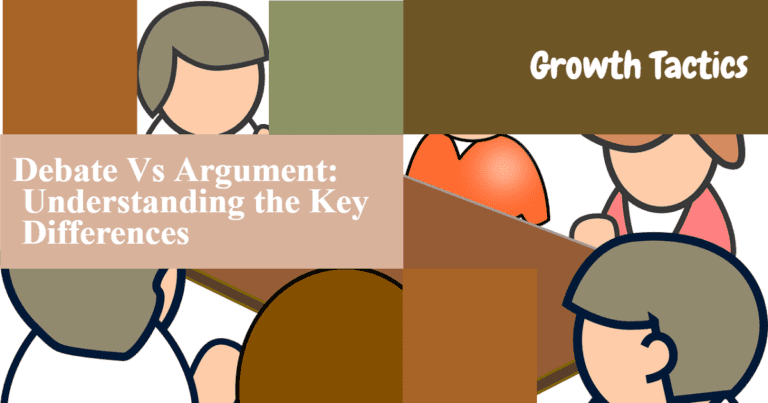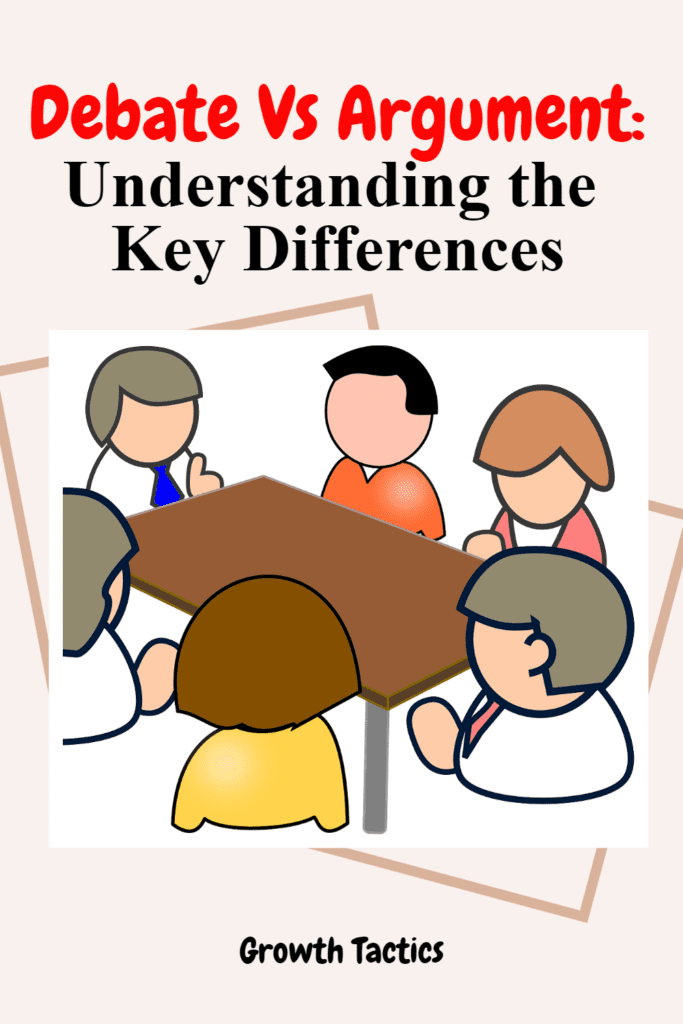Debate and argument are two terms often used interchangeably, but they have distinct meanings and purposes. In this blog post, we will delve into the essential differences between debate and argument, exploring their definitions, structures, and methods of persuasion. Understanding these differences will help us navigate discussions and disagreements more effectively, whether in a formal setting or a casual conversation. So let’s dive in and uncover the nuances between debate and argument.
Jump To Section
What is a Debate?
A debate is a formal and structured form of discussion where two or more participants present and exchange contrasting viewpoints on a specific topic. It is a methodical examination of arguments and counterarguments, aimed at arriving at a well-reasoned conclusion. Debates require participants to present their ideas and opinions in a logical and persuasive manner, often supported by evidence or examples.
The key difference between debate and other forms of discussion is that debates are typically more structured and organized. They follow a set format with rules and time limits, allowing each participant to present their points of view and respond to opposing arguments. Debates often involve a moderator or a panel of judges who ensure that the discussion stays on track and maintains a respectful atmosphere.
The goal of a debate is not necessarily to convince the opposing side but rather to present a compelling case and engage in a thoughtful exchange of ideas. Debates encourage critical thinking, research, and effective communication skills. They provide a platform for exploring different perspectives and fostering a deeper understanding of complex issues.
In a debate, participants are expected to adhere to certain guidelines and principles. They should address the topic at hand, provide evidence to support their arguments, and engage in respectful discourse. Debates are an important part of academia, politics, and various professional fields as they allow for an in-depth exploration of ideas and foster intellectual growth.
Overall, debates provide an organized and structured framework for discussing and evaluating opposing viewpoints, encouraging participants to present their arguments effectively and engage in a rigorous and constructive exchange of ideas.
What is an Argument?
An argument, on the other hand, is a less formal and more flexible form of discussion that can happen in a variety of settings. It involves expressing a point of view and providing reasons and evidence to support it. Unlike debates, arguments may not follow a structured format or adhere to any specific set of rules.
Arguments can be either logical or emotional, depending on the context and the participants involved. Logical arguments present a series of well-reasoned points that aim to convince the audience of the validity of a particular viewpoint. Emotional arguments appeal to the audience’s emotions and sense of values, such as fear, compassion, or justice.
The primary goal of an argument is to persuade the opposing side to accept one’s point of view. Arguments aim to convince the audience that one’s position is the most reasonable, accurate, or beneficial. Unlike debates, arguments are more informal and can be conducted in a more conversational tone.
Arguments can take many forms, from a casual discussion over dinner to a contentious political campaign. Arguments can be either constructive or destructive, depending on how they are conducted. Constructive arguments aim to promote understanding and seek a resolution. Destructive arguments, on the other hand, aim to undermine the opposing side and can lead to a breakdown in communication.
In conclusion, an argument is an informal and flexible form of discussion that aims to persuade the opposing side. It is an essential part of everyday communication and can take many forms. Arguments can be either logical or emotional and can either be constructive or destructive.
Debate Vs Argument: Key Differences
While debate and argument may seem similar at first glance, there are several key differences that set them apart.
Structure and Formality
One of the main differences between debate and argument lies in their structure and formality. Debates are typically more structured and follow a set format with rules and time limits. They often involve a moderator or a panel of judges to ensure fairness and order. In contrast, arguments are less formal and can take place in various settings, from casual conversations to online discussions. Arguments may not follow a specific structure or adhere to any strict rules.
Goal and Outcome
The ultimate goal of a debate is to reach a well-reasoned conclusion or solution through the presentation and examination of arguments. It focuses on the exploration of different perspectives, providing a platform for thoughtful exchange and intellectual growth. On the other hand, the primary goal of an argument is to persuade the opposing side to accept one’s point of view. Arguments are aimed at convincing the audience of the validity, reasonableness, or benefits of a particular viewpoint.
Level of Engagement
Debates often involve active participation from multiple individuals, each presenting their viewpoints and engaging in a back-and-forth exchange of ideas. Debates encourage rigorous research, preparation, and effective communication skills. Arguments, on the other hand, can involve a single individual expressing their point of view or engaging in a conversation with one or more people. Arguments may not require the same level of systematic preparation and can be more spontaneous.
Approach and Style
Debates tend to be more objective and focused on logical and evidence-based reasoning. Participants in debates are expected to support their arguments with facts, examples, and expert opinions. Arguments, on the other hand, can be more subjective and may incorporate emotional appeals or personal experiences to persuade. The style and approach of arguments can vary widely depending on the context and participants involved.
Resolution
In debates, the goal is to arrive at a conclusion or decision based on the presented arguments and evaluation of evidence. On the contrary, arguments do not necessarily require a resolution. They can end without a clear winner or final decision. The aim of an argument is often to present a viewpoint and persuade others, rather than to reach a consensus or make a conclusive judgment.
In summary, debates and arguments differ in their structure, goals, level of engagement, approach, and resolution. Having a clear understanding of these differences can help in effectively navigating discussions and choosing the appropriate approach based on the context and desired outcome.
Persuasion in Debates and Arguments
Persuasion plays a crucial role in both debates and arguments, as the primary goal of both forms of discussion is to convince others of a particular viewpoint. However, the approach to persuasion can differ between debates and arguments.
Debates: Logical and Evidence-Based Persuasion
In debates, persuasion is often centered around logical and evidence-based reasoning. Participants strive to present well-constructed arguments supported by facts, data, expert opinions, and logical deductions. The use of evidence and logical reasoning helps to make a compelling case and persuade the audience.
Effective persuasion in debates involves thorough research and preparation. Participants need to gather relevant information, critically analyze it, and present it in a clear and organized manner. They should anticipate potential counterarguments and address them effectively. By providing solid evidence and logical reasoning, debaters aim to convince the audience that their position is the most reasonable and valid.
Debates also require effective communication skills, including the ability to articulate complex ideas clearly and concisely. Presenting counterarguments respectfully and addressing them with logical rebuttals helps to strengthen one’s persuasive case.
Arguments: Emotional and Personal Persuasion
In arguments, persuasion can be more emotional and personal in nature. Since arguments often take place in less formal settings, such as everyday conversations or online discussions, appeals to emotions, values, and personal experiences can be effective means of persuasion.
Unlike debates that rely heavily on evidence and logical reasoning, arguments may place greater emphasis on connecting with the emotions and values of the audience. By appealing to empathy, fear, compassion, or a sense of justice, individuals can make their arguments more relatable and persuasive.
In addition, personal anecdotes and experiences can be powerful tools in arguments, as they help to establish credibility and create a connection with the audience. Sharing personal stories or experiences that illustrate the impact of a particular viewpoint can be compelling and persuasive.
While emotional and personal persuasion can be effective in arguments, it is important to strike a balance. It is crucial to support arguments with some level of evidence and reasoning to maintain credibility and ensure a strong persuasive impact.
Common Ground: Finding Shared Beliefs and Values
Regardless of whether it is a debate or an argument, finding common ground is essential for effective persuasion. By pinpointing shared beliefs, values, or goals, participants can establish a basis for agreement and build upon it to present their viewpoint.
Finding common ground helps to foster understanding and encourages the audience to be more receptive to one’s arguments. It also creates an environment where individuals can engage in a constructive exchange of ideas, leading to a more productive discussion.
In conclusion, both debates and arguments rely on persuasion to convince others of a particular viewpoint. Debates generally focus on logical and evidence-based persuasion, while arguments may incorporate emotional and personal elements. Understanding the nuances of persuasion in each context allows individuals to engage in more effective communication and increase their chances of successfully influencing others.
Conclusion
In conclusion, debates and arguments are two distinct forms of discussion that serve different purposes and require different approaches. While both involve presenting a viewpoint and persuading others, the key differences lie in their structure, formality, goals, level of engagement, and style of persuasion.
Debates are more structured and formal, following specific rules and formats. They aim to explore different perspectives, provide a platform for intellectual growth, and reach a well-reasoned conclusion through logical and evidence-based persuasion. Effective debates require thorough research, preparation, and the ability to present arguments in a clear and compelling manner.
Arguments, on the other hand, are less formal and can occur in various settings. They focus on persuading the opposing side to accept a particular viewpoint, often by incorporating emotional appeals, personal experiences, and connecting with the values and emotions of the audience. Arguments can be more spontaneous, and although evidence and logical reasoning are still important, they may not require the same level of formal preparation as debates.
Understanding these differences is crucial for engaging in effective communication and navigating discussions. Whether it’s a structured debate or an informal argument, recognizing the context and desired outcome will help in choosing the most suitable approach.
Both debates and arguments play important roles in everyday life, from academic settings to personal conversations. They allow individuals to express their opinions, challenge ideas, and gain a deeper understanding of complex issues. By mastering the art of debate and argument, individuals can become more effective communicators, critical thinkers, and persuasive advocates for their viewpoints.
So, the next time you find yourself engaged in a lively discussion, remember the distinctions between debates and arguments and employ the appropriate strategies to convey your message effectively. Whether you rely on logical reasoning or tap into the emotions and values of your audience, understanding the nuances of persuasion in each context will greatly enhance your ability to influence and persuade others.


